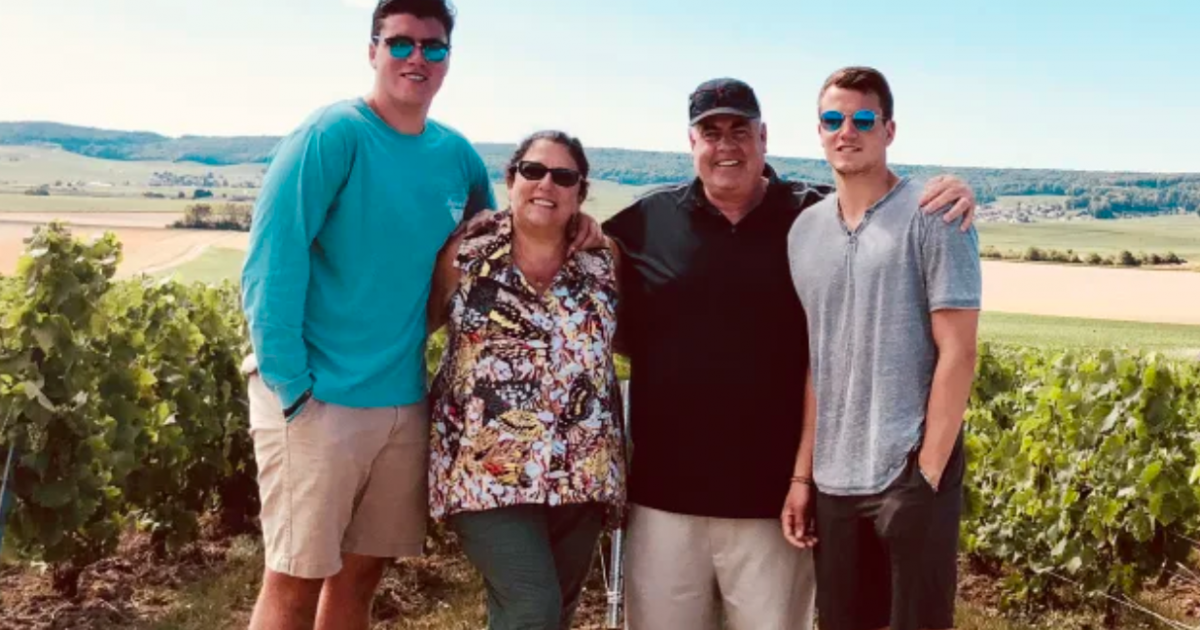It's Okay to be 'Bossy' When It Comes to Cancer and Your Health
- Publicist Amy Weirick from Columbus, Ohio, was a decade into menopause when she experienced bleeding. It turned out to be a rare type ovarian cancer.
- At first, the wife and mother was dismissed by her doctor, but the self-described “bossy pants” indeed showed everyone who’s boss. She went straight to an oncologist who found her stage 1 cancer.
- It is crucial to never ignore warning signs, which are often very subtle when it comes to this “silent” disease. Always be your own advocate.
"I was really mad at my gynecologist and disappointed, like 'How could you not know this?'" the wife and mother, age 60, expressed to TODAY. "There's no reason that a woman would bleed after menopause."
Read More"It was very very lucky, not just luck but pluck, that I stayed on it and I didn't just say, 'Oh well, we'll just keep an eye on it,'" Amy said. "I don't think ovarian cancer is a good thing to keep an eye onbecause you can't."
The persistent PR prowho describes herself as “bossy pants” on her Instagram pagewent directly to an oncologist for a second opinion, and is so thankful that she did.
"I said, 'Well, I feel like I'm wasting your time if it isn't cancer,' and he said, 'Look my job when a women is bleeding after menopause is to assume it's cancer until I prove to myself otherwise. Your job is to just not worry about it and live your life and let me take care of the rest,'" Amy recalled of her wonderful doctor.
They found a granulosa tumor, which is luckily a slow-growing cancer, but it can recur, or come back. "It's only 1 or 2% of all ovarian cancers," Amy explained. She was diagnosed at stage 1, underwent surgery last September, and is now cancer-free to continue enjoying life and travel with her family.
View this post on Instagram
We can all learn from Amy’s story, who reminds us that we are the boss of our own bodies, and shouldn’t hesitate to direct our doctors when we feel something is off.
Understanding Ovarian Cancer
Symptoms of ovarian cancer can be subtle, which is one reason why so many cancers are diagnosed at an advanced stage. Amy was extremely lucky that she showed symptomsin her case, bleeding, and the fact that she was diagnosed at stage 1.
Ovarian Cancer Symptoms Can Be Hard to Spot
Dr. Kimberly Resnick, gynecologic oncologist at MetroHealth in Cleveland, Ohio told SurvivorNet that the disease is often referred to as “the sleeping lion.”
"It's hard, because 75% of women who walk into our office with ovarian cancer, unfortunately, are going to walk in with advanced stage disease,” Dr. Resnick said.
Ovarian Cancer Warning Signs
Many of the symptoms women experience mimic those that we experience in everyday life, and that can be attributed to any number of other conditions or health problems. That's why it's so important for women to be on the lookout for common symptoms like these:
- Bloating
- Abdominal pain
- Nausea
- Quickly feeling full when eating
The majority of women with ovarian cancer complain of feeling early satiety, which essentially means that they quickly begin to feel full when eating a meal. Nausea, vomiting, and bloating are also commonly reported by patients. "It's not uncommon for me to ask a patient if her pants still fit her and she states that they're not fitting; that she's gone to an elastic waistband," Dr. Resnick said.
Women may also notice that they are gaining weight in their abdomen, even though they are losing weight in their face and neck. And they may find that their legs are getting extremely swollen. Other common signs include pain, and possibly changes in bathroom habits.
“These symptoms have all been reported by patients who come to the clinic and are subsequently diagnosed with advanced stage ovarian cancer.
Be An Advocate like Amy
Unlike many other types of cancer, there are also no routine screening tests for ovarian cancer, which is why it is vital to be highly self-aware and pay attention to your body’s signals.
In fact, the most valuable thing that Dr. Resnick tells a patient is to be an advocate for yourself and trust your body. "You know your body better than anyone does, and better than any physician will probably ever know," she says. "So trust your body and listen to your symptoms."
‘You Are Your Own Best Advocate’Recognizing the Subtle Symptoms of Ovarian Cancer
If your symptoms have persisted for more than a week, see your doctor. And if your doctor isn't taking your symptoms seriously or can't find a cause for them, you have the right to seek out a second opinion. Keep pushing for a diagnosis until you get one that adequately addresses your symptoms.
Be an advocate like Amy!
Learn more about SurvivorNet's rigorous medical review process.

